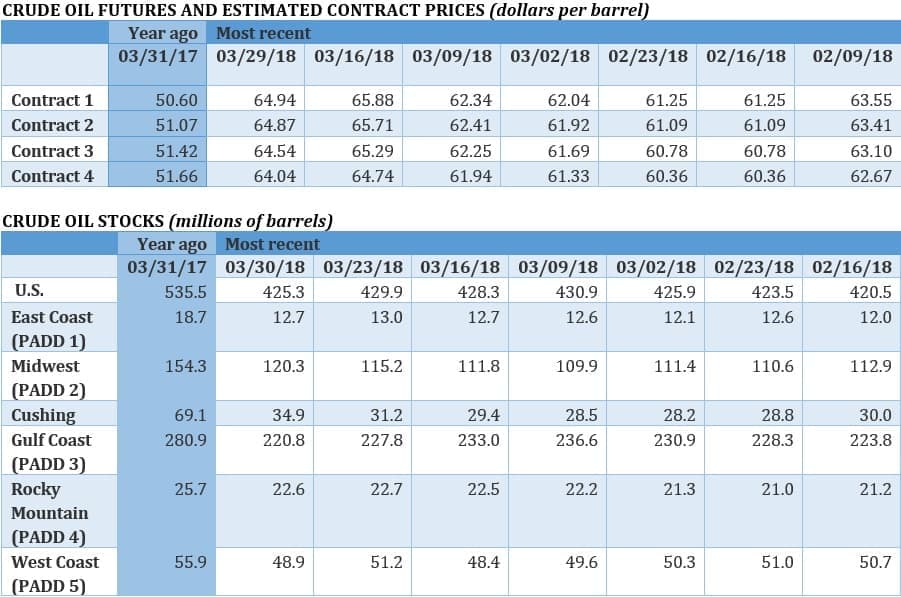Despite a bullish EIA report, trade war fears are weighing on oil markets, pushing crude prices to their lowest point since March.

(Click to enlarge)

(Click to enlarge)

(Click to enlarge)

(Click to enlarge)

(Click to enlarge)

(Click to enlarge)

(Click to enlarge)
Friday, April 6, 2018
The escalating trade war between China and the U.S. is likely drowning out a rather bullish EIA report, which showed a strong inventory decline last week. The oil market is tightening, but trade concerns are dominating headlines.
U.S. mulls another $100 billion in tariffs on China. In a rapidly escalating trade war, President Trump called China’s recent tariffs “unfair,” and said he was considering an additional $100 billion in tariffs on China. Trump said that the tariffs on U.S. soy and pork would hurt American farmers, and he instructed the Department of Agriculture to come up with a plant to protect the U.S. agricultural sector. If the administration follows through on the $100 billion in tariffs, China’s Commerce Ministry said it would “follow suit to the end, not hesitate to pay any price, resolutely counterattack and take new comprehensive measures in response.” A wide range of U.S. industries are opposed to the Trump administration’s actions. Dean Garfield, president of the Information Technology Industry Council, a high-tech trade group, called the Trump move “irresponsible and destabilizing,” according to the WSJ.
Will energy industry become ensnared in trade war? Crude oil prices sank after each round of tariffs, and while there are real concerns about the ripple effects on demand and global economic growth, it is unclear whether or not the oil and gas relationship will be directly targeted in a major way. China needs the energy, and oil and gas exports have succeeded in cutting the U.S. trade deficit, a particularly concerning metric for the Trump administration. Some analysts think U.S. oil and gas exports to China are too important for both countries. But not everyone agrees. “China can ditch American energy at any time because there’s plenty of supplies elsewhere, whereas for the U.S., energy is a sensitive subject,” Will Yun, a commodities analyst at Hyundai Futures Corp. told Blomberg. “If China shows its willingness to impose tariffs on crude, it will send a shock wave through markets,” said Min Byungkyu, a global strategist at Yuanta Securities Co. Related: Escalating Trade War Ups Pressure On Oil Prices
WoodMac: North Sea, Mexico most attractive for exploration. The UK’s North Sea, offshore Mexico and shallow water Norway are some of the most competitive locations for new oil and gas projects, according to Wood Mackenzie. Cost-cutting has lowered breakeven costs for large-scale projects, and WoodMac says that could pave the way for 30 new FIDs this year for major oil and gas projects. The average breakeven price would be $44 per barrel of oil equivalent.
Permian hitting pipeline bottlenecks. Permian oil prices are starting to suffer from discounts because the capacity of the region’s pipelines is starting to max out. Production is growing so quickly that the region is running into a pipeline shortage. According to Genscape, pipeline utilization has reached 96 percent in the last four weeks. There are pipeline projects in the works to expand takeaway volumes, but it will take time for those pipelines to come online. The shortage might force producers to slow or even stop production at some point.
Cyberattacks hit pipelines. A series of cyberattacks have struck U.S. oil and gas pipelines in the past week, forcing several of them to temporarily shut down. A cyber-attack affected the operations of Oneok (NYSE: OKE), which runs gas pipelines in the Permian and Rocky Mountains. There were several other incidents days earlier. Bloomberg reports that Energy Transfer Partners (NYSE: ETP), Boardwalk Pipeline Partners LP (NYSE: BWP), and Chesapeake Utilities Corp.’s (NYSE: CPK) Eastern Shore Natural Gas all reported breakdowns in communications. The attacks hit a third party electronic data interchange (EDI) platform, not the pipeline operations themselves.
Tesla under fire, but jumps to #1 in EV sales. Tesla (NASDAQ: TSLA) sold 8,180 Model 3s in the first quarter, more EVs than any other automaker. Elon Musk has been under fire in recent weeks as Tesla’s financial and manufacturing problems have mounted. But the first quarter figures provided some breathing room as they were seen as trending in the right direction. “Good enough,” wrote Robert W. Baird & Co. analyst Ben Kallo.
U.S. refiners diversify away from Venezuelan oil. Venezuelan oil exports to the U.S. have plummeted over the past year, falling to just 438,000 bpd in January, down to about a third of the typical level from a decade ago. Still, a handful of Gulf Coast refiners have depended on Venezuelan oil, a vulnerability as the U.S. government considers sanctions. S&P Global Platts reports that some Gulf Coast refiners have begun switching over to blends from Colombia, Iraq and even Chad. "All of these refiners, and the others that import Venezuelan crude, have actively developed plans in case sanctions are enacted," said John Auers, executive vice president of Turner, Mason & Company. One reason that Washington has hesitated at tougher sanctions on Venezuela is because of a reluctance to damage U.S.-based refiners. The fuel switching might give more leeway for U.S. sanctions.
Related: Oil Prices Poised To Rise As Cycle Comes To An End
Scandals mount for EPA chief. EPA administrator Scott Pruitt has faced a barrage of negative media this week, detailing a litany of scandals that threaten his tenure at the agency. Inappropriate spending on furniture and first-class travel; demoting staff for questioning his spending habits; and renting a house from an energy lobbyist – these issues have apparently angered the White House. Pruitt has arguably succeeded more in his mission than any other cabinet official, which could yet keep him on board. But there are rumors the White House is considering sacking him.
Solar installations grew faster than fossil fuels in 2017. Last year, for the first time, global solar capacity grew faster than fossil fuels for the first time. Renewable energy accounted for three-fifths of total net power capacity growth in 2017. Today, renewables now account for 12 percent of total electricity generation, double the share from 2010. Costs for solar and wind are falling dramatically and are increasingly competitive with coal and gas in much of the world.
By Tom Kool for Oilprice.com
More Top Reads From Oilprice.com:
- Is This Natural Gas Major About To Be Taken Over?
- Tesla: The Biggest Loser In The Trade War
- Venezuela’s Oil Sector May Soon Have New Owners



















However, I am of the opinion that the current tariffs saga will soon come to an end because both the United States and China will realize that both will lose from an escalating trade war between then along with the global economy.
Such a war has, in my opinion, less to do with alleged China’s unfair trade practices or US trade deficit and intellectual property theft as President Trump depicted it and more to do with the launch of China’s crude oil futures contract.
China is not going to bend the knee before President Trump and will retaliate against any new set of tariffs imposed on it.
Sooner or later President Trump will realize that he could be heading into serious trouble that goes beyond trade. That is the moment when he will decide to stop his trade war against China and accept the inevitable, namely, the petro-yuan is here to stay. Still, the global oil market estimated at $14 trillion is big enough to accommodate both the petro-yuan and the petrodollar. This is a far better option than damaging the global economy and themselves by a trade war.
Dr Mamdouh G Salameh
International Oil Economist
Visiting Professor of Energy Economics at ESCP Europe Business School, London